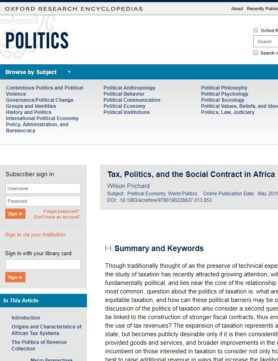Oxford Research Encyclopedia of Politics May 2019 Update
Though traditionally thought of as the preserve of technical experts—lawyers, economists and accountants—the study of taxation has recently attracted growing attention, with mounting recognition that taxation is fundamentally political, and lies near the core of the relationship between states and citizens. The first, and most common, question about the politics of taxation is: what are the political barriers to more effective and equitable taxation, and how can these political barriers may be overcome? However, it is important that any discussion of the politics of taxation also consider a second question: How can the expansion of tax collection be linked to the construction of stronger fiscal contracts, thus ensuring responsiveness and accountability in the use of tax revenues? The expansion of taxation represents a transfer of wealth from private citizens to the state, but becomes publicly desirable only if it is then consistently translated in improvements in publicly provided goods and services, and broader improvements in the quality of governance. This makes it incumbent on those interested in taxation to consider not only how best to raise additional revenue, but how best to raise additional revenue in ways that increase the likelihood that new revenue will be translated into broader public benefits.
It is now widely accepted that in many cases political resistance represents the most important barrier to more effective taxation in Africa—particularly with respect to the taxation of elite groups. This, in turn, reflects two broad political challenges: the expansion of taxation frequently confronts resistance from influential political and economic elites, while it has historically been very difficult to build popular coalitions in favor of taxation in contexts of limited transparency and significant distrust of taxation and the state. That said, recent research has shed growing light on the contexts in which reform is more likely, and the reform strategies that may contribute to overcoming political resistance. This has been accompanied by the growth of parallel research that has highlighted the contexts in which the expansion of taxation is most likely to spur public mobilization and demand-making—and thus the strategies that reformers might adopt in seeking to strengthen the links between revenue-raising and improvements in public services and accountability. Ultimately, it increasingly appears that the kinds of political strategies that can support more effective and equitable taxation are also likely to contribute to encouraging encourage expanded popular engagement and stronger links between taxation and public benefits. These include efforts to stress horizontal equity in tax collection, to expand transparency and popular engagement in tax debates and to more clearly link expanded revenue to specific public uses, in order to build popular support for reform. Such strategies have the potential to contribute to virtuous circles of reform in which new taxation is translated into valued public benefits; thus building popular support for the further expansion of more equitable taxation.
Citation
Prichard, W. (2019). Tax, politics, and the social contract in africa. In Oxford Research Encyclopedia of Politics. Oxford University Press. doi: http://dx.doi.org/10.1093/acrefore/9780190228637.013.853
